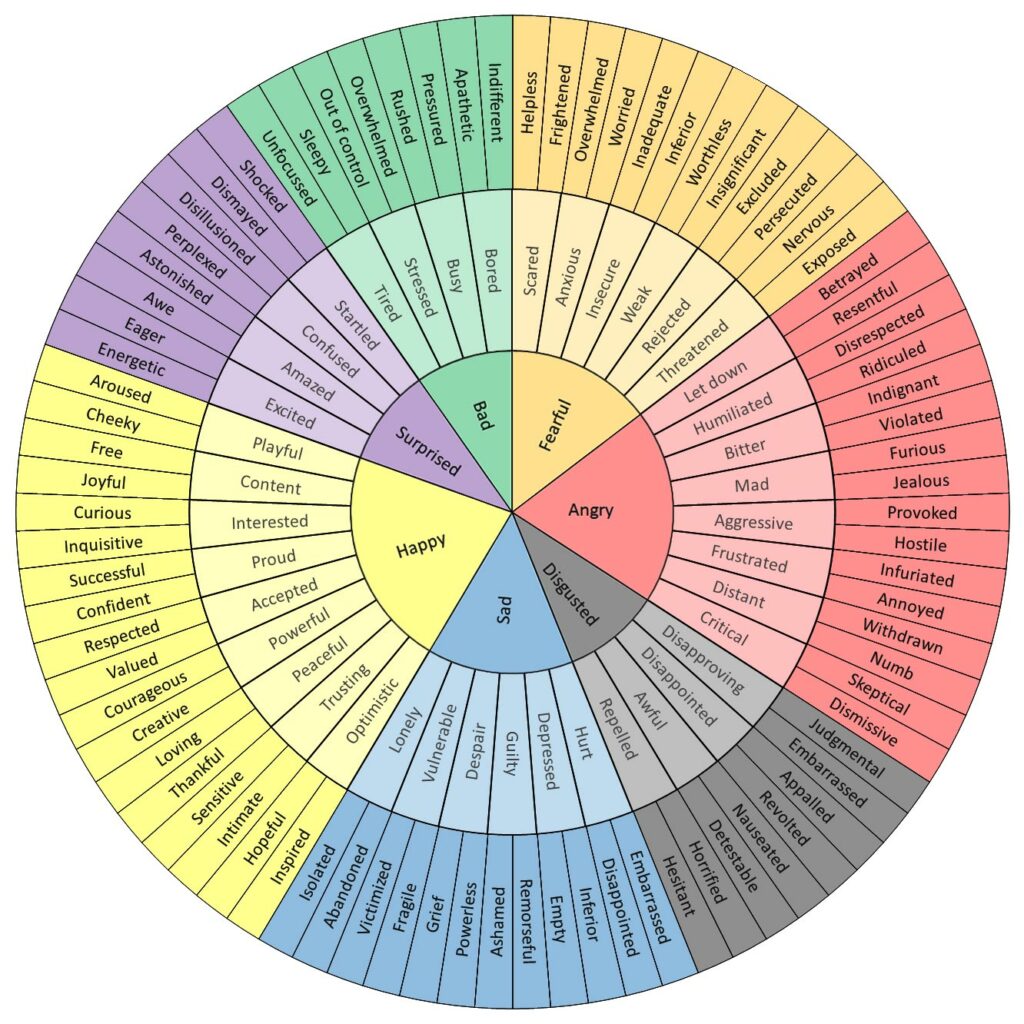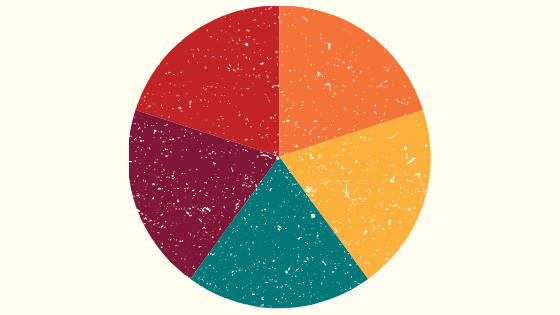Sometimes I feel…off. Grumpy, sensitive, defensive, not quite sure how I got there or what I need to do to feel “on” again.
Living with Complex-PTSD means that I sometimes have intense emotional responses that don’t line up with my current situation, because my old, traumatized parts can take over my emotional control room if current discomfort is subconsciously mistaken for a threat. I’ve been doing EMDR therapy for years to help me heal from Complex-PTSD, and one of the things that has been most empowering for me is learning how to identify what the hell I’m actually feeling. That first step of naming my emotion enables me to take better care of myself and feel grounded. The tool that helps me the most with this is the aptly named Emotions Wheel or Feelings Wheel, and while it helps me out with my Complex-PTSD brain, it can be helpful for everyone.
The Deal with the Wheel
You can access many different options of the Emotions/Feeling Wheel online via a quick Google search, but I like the one below a lot due to the vast options and pathways it includes.

[Image description: A wheel of three concentric circles that lists emotions in 7 basic categories at the center: bad, fearful, angry, disgusted, sad, happy, surprised. Each category has its own color, and branches off from that one broad emotion to more specific emotions to even more specific emotions.]
To use a Feelings Wheel, start at the center and work your way out to find a specific word that describes how you feel. In this version of the wheel, you begin with seven broad emotions: Happy, Sad, Disgusted, Angry, Fearful, Bad, and Surprised. Choose whichever general word from these seven that aligns most with what you currently feel. Next, branch out to the middle tier and see which feelings you most fit into that split off your center choice. For example, if you stated that you felt Angry, which of the eight second tier examples do you align with the most? Finally, split off once more into the outermost wheel and choose the next branched off emotion. If you had selected Angry and Mad, are you actually feeling Jealous? If you had selected Sad and Lonely, are you feeling more Isolated or Abandoned?
By giving a specific name to the way you are feeling, you will be better able to choose a coping mechanism that supports you.
Sometimes your emotions might not neatly fit into the wheel. For example, I sometimes get overwhelmed and basically feel like the cat in this gif:
![[gif description: looped video of a fluffy white cat sitting on a desk repeatedly knocking items off the edge. text reads “fuck this, fuck that, fuck those too, fuck all these, fuck this thing in particular”]](https://thetendingyear.com/wp-content/uploads/2019/08/Cat-Gif-Video.gif)
[gif description: looped video of a fluffy white cat sitting on a desk repeatedly knocking items off the edge. text reads “fuck this, fuck that, fuck those too, fuck all these, fuck this thing in particular”]
When I experience this combination of negative emotions, I feel this close to self-sabotaging and driving off into the sunset with my middle fingers up. In the past, that feeling led me to reach for coping mechanisms that seemed to help on the short term (like smoking a cigarette or buying something expensive online), but those mechanisms didn’t really address the issue at hand, which may have been that I needed to set more explicit boundaries, ask for clearer instructions on an assignment I’d been given, or simply put my phone on silent for an hour and take a nap until I could see the situation more clearly. When I take a minute to breathe and use the Feelings Wheel before I react, I can identify my actual emotions as a combination of indignant + stressed, hold space for my right to feel that way, and choose a much healthier coping mechanism.

Identify Your Actual Feelings
The next time you’re feeling off or even “meh,” try using the above Feelings Wheel to identify your emotions as clearly as possible. Once you identify what word describes the way you feel, complete these sentences:
I feel ______.
I need _____.
The goal here is twofold: to learn how to self-soothe and cope in healthy ways, and to clearly identify if you need outside help and what help you need so you can explicitly and directly ask for it. Do you need a friend to listen without critiquing you or offering a solution? Do you need to seek the guidance of someone who has gone through your situation before? Do you need to cancel or reschedule plans? Do you need support from your best friend, your therapist, your boss, your coach, or your online support group? If you can identify how you feel and what you need to feel better, you will have more agency in making choices that benefit you in the long term. Also, remember that sometimes what you may need is to give yourself permission to just hold space for difficult feelings with as little judgment as possible until they pass.
Newsletter
Sign up below to access my free newsletter, Tending with Dr. Kate Henry.

